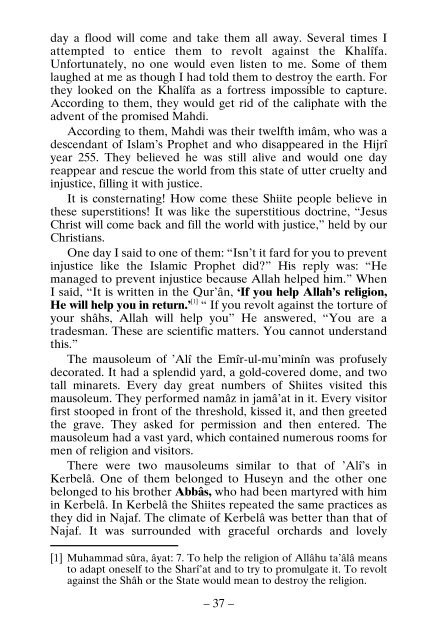Confessions Of A British Spy
Muhammad of Najd was the sort I had been looking for. For his scorn for the time’s scholars, his slighting even the (earliest) four Khalîfas, his having an independent view in understanding the Qur’ân and the Sunna were his most vulnerable points to hunt and obtain him. So different this conceited youngster was from that Ahmed Efendi who had taught me in Istanbul! That scholar, like his predecessors, was reminiscent of a mountain. No power would be able to move him. Whenever he mentioned the name of Abû Hanîfa, he would stand up, go and make an ablution. Whenever he meant to hold the book of Hadîth named he would, again, make an ablution. The Sunnîs trust this book very much. Muhammed of Najd, on the other hand, disdained Abû Hanîfa very much. He would say, “I know better than Abû Hanîfa did. In addition, according to him, half of the book of wrong.
Muhammad of Najd was the sort I had been looking for. For
his scorn for the time’s scholars, his slighting even the (earliest)
four Khalîfas, his having an independent view in understanding
the Qur’ân and the Sunna were his most vulnerable points to hunt
and obtain him. So different this conceited youngster was from
that Ahmed Efendi who had taught me in Istanbul! That scholar,
like his predecessors, was reminiscent of a mountain. No power
would be able to move him. Whenever he mentioned the name of
Abû Hanîfa, he would stand up, go and make an ablution.
Whenever he meant to hold the book of Hadîth named he would, again, make an ablution. The Sunnîs trust this book
very much.
Muhammed of Najd, on the other hand, disdained Abû Hanîfa
very much. He would say, “I know better than Abû Hanîfa did.
In addition, according to him, half of the book of wrong.
Create successful ePaper yourself
Turn your PDF publications into a flip-book with our unique Google optimized e-Paper software.
day a flood will come and take them all away. Several times I<br />
attempted to entice them to revolt against the Khalîfa.<br />
Unfortunately, no one would even listen to me. Some of them<br />
laughed at me as though I had told them to destroy the earth. For<br />
they looked on the Khalîfa as a fortress impossible to capture.<br />
According to them, they would get rid of the caliphate with the<br />
advent of the promised Mahdi.<br />
According to them, Mahdi was their twelfth imâm, who was a<br />
descendant of Islam’s Prophet and who disappeared in the Hijrî<br />
year 255. They believed he was still alive and would one day<br />
reappear and rescue the world from this state of utter cruelty and<br />
injustice, filling it with justice.<br />
It is consternating! How come these Shiite people believe in<br />
these superstitions! It was like the superstitious doctrine, “Jesus<br />
Christ will come back and fill the world with justice,” held by our<br />
Christians.<br />
One day I said to one of them: “Isn’t it fard for you to prevent<br />
injustice like the Islamic Prophet did?” His reply was: “He<br />
managed to prevent injustice because Allah helped him.” When<br />
I said, “It is written in the Qur’ân, ‘If you help Allah’s religion,<br />
He will help you in return.’ [1] “ If you revolt against the torture of<br />
your shâhs, Allah will help you” He answered, “You are a<br />
tradesman. These are scientific matters. You cannot understand<br />
this.”<br />
The mausoleum of ’Alî the Emîr-ul-mu’minîn was profusely<br />
decorated. It had a splendid yard, a gold-covered dome, and two<br />
tall minarets. Every day great numbers of Shiites visited this<br />
mausoleum. They performed namâz in jamâ’at in it. Every visitor<br />
first stooped in front of the threshold, kissed it, and then greeted<br />
the grave. They asked for permission and then entered. The<br />
mausoleum had a vast yard, which contained numerous rooms for<br />
men of religion and visitors.<br />
There were two mausoleums similar to that of ’Alî’s in<br />
Kerbelâ. One of them belonged to Huseyn and the other one<br />
belonged to his brother Abbâs, who had been martyred with him<br />
in Kerbelâ. In Kerbelâ the Shiites repeated the same practices as<br />
they did in Najaf. The climate of Kerbelâ was better than that of<br />
Najaf. It was surrounded with graceful orchards and lovely<br />
[1] Muhammad sûra, âyat: 7. To help the religion of Allâhu ta’âlâ means<br />
to adapt oneself to the Sharî’at and to try to promulgate it. To revolt<br />
against the Shâh or the State would mean to destroy the religion.<br />
– 37 –


